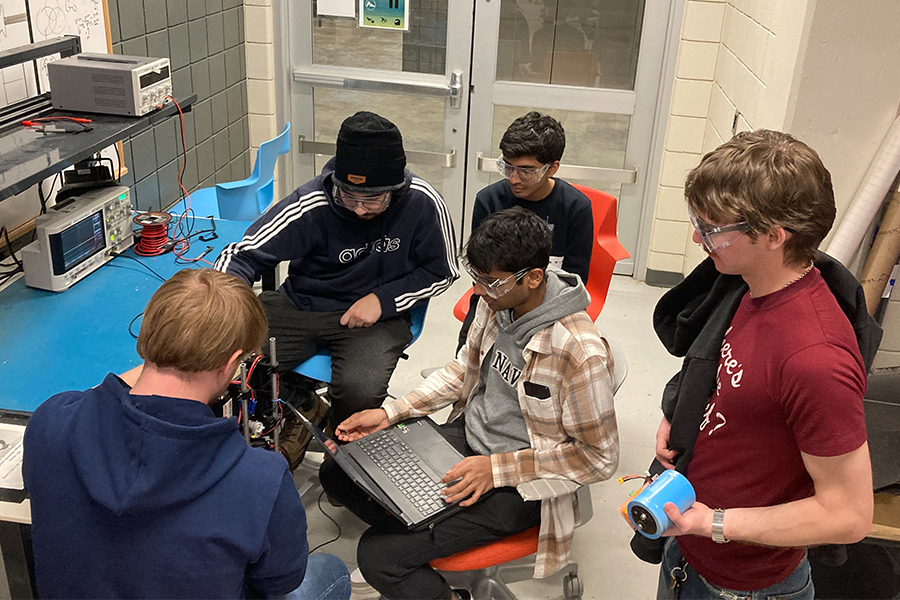Purdue Space Program allows student space enthusiasts to apply their classroom knowledge to drones, rockets, and more

The Purdue Space Program (PSP) is the largest engineering student organization on campus, with more than 500 active members. The organization primarily focuses on space-related activities, such as miniature satellites and high-power rocketry, reaching as far as O-class motors and liquid rocketry projects.
PSP operates under an umbrella structure, managing various teams, each pursuing its own projects. These teams, averaging between 40 to 75 members each, work on diverse goals under the overarching goal of advancing aerospace engineering. The organization provides multidisciplinary opportunities, facilitating collaboration among members from different academic backgrounds, such as aerospace engineering, electrical and computer engineering, and computer science.
“We’re always looking for more non-aero students,” says William Russel, a student in the School of Aeronautics and Astronautics and co-president of PSP. “Aero majors are great, but there are things we don’t know how to do, for instance, building an avionics board. That’s why ECE students and students from other majors are needed.”
The mission of PSP's Active Controls (PSP-AC) team is to advance vertical takeoff, vertical landing (VTVL) technology at the collegiate level, which is a critical step toward rocket reusability. The team comprises of multiple subteams that take on certain aspects of this multifaceted mission. These subteams include Structures, Propulsion, Guidance Navigation & Controls (GNC), and Avionics.
Xander Beal, a sophomore in Purdue’s Elmore Family School of Electrical and Computer Engineering (Purdue ECE), says he joined PSP-AC to get more experience working on a team focused on engineering projects.
“Especially space and ECE-related projects,” says Beal. “I like how hands-on the project is and seeing how the electronics and avionics part ties into the project as a whole.”
Active Controls is working on an autonomous drone called Astra, designed to simulate the dynamics of a traditional rocket. This is one of their two main projects as a team, and it has the most relevant subsystems to Purdue ECE students.
“Once we’re comfortable with the control algorithms created during this process of flying a vehicle with an electric ducted fan, we’ll be able to use those algorithms on an actual ‘fire-breathing’ rocket,” says Pavit Hooda, an aerospace major who is the project manager and co-founder of the Active Controls team. “It’s essentially a test platform that allows us to use our software on a vehicle that couldn’t possibly blow up on us, therefore allowing for rapid testing and developing.”
Thomas Greer is a sophomore in Purdue ECE. He joined the PSP-AC team to apply the knowledge and concepts he has gained in class to hardware.
“It also allows me to be part of the aerospace industry that I have always been interested in,” Greer says. “My favorite part about PSP-AC is being able to contribute to a large team and a large project, while also having my work, and all of Avionics, being an integral part of what we do.”
The Active Controls team is preparing for its next milestones, a tethered hop test for ASTRA and the hot-firing of a bipropellant propulsion system for their next lander vehicle.
Despite facing challenges inherent in developing advanced control systems and versatile propulsion systems, PSP-AC remains undeterred. The organization leverages industry contacts to provide opportunities for collaboration and support, ensuring its members gain valuable experiences and connections in industry.
Through perseverance, innovation, and a relentless pursuit of knowledge, the Purdue Space Program is equipping its members with the skills and connections necessary for successful careers in the aerospace industry.
